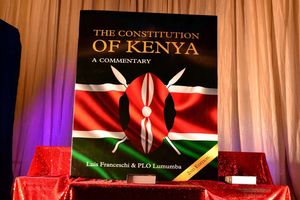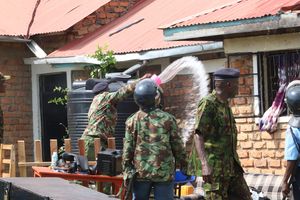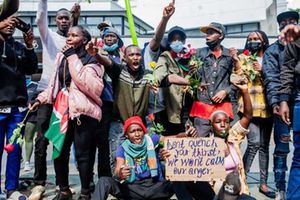
A Kenyan wearing a decoration of the national flag on his face at the Safaricom Stadium in Kasarani on December 12, 2013 during the 50th Jamuhuri Day celebrations.
Today I reflect on the character and political identity of the prototype we call “Kenyan.” But I want to do so through the prism of the so-called public, often an amorphous catch-all for the “masses of the people,” also known as the hoi polloi. It’s these faceless individual humans from whence the sovereignty of the state springs.
At the risk of violating the rules against determinism, or essentialism, I want to roughly state that most countries have a national character in the broadest of strokes. Most times, you can tell a Frenchman from an American, or a Brit, a South African, Russian, Indian, Nigerian, and Chinese. And it’s not the looks, though those are important data point.
It's about an elusive montage of things we call” identity.”
Of course keep in mind that most nations have many sub-nations in them — each distinct, though usually united by some common, often intangible, broad threads. My concern today in this huge slice of thought is what I call Kenya’s two publics that are usually in tension with one another.
One public is responsible for most of our problems. The other, which could’ve been more helpful, is either ambivalent or on the outside looking in, powerless. These two publics are found both in the elites of the country as well as the commoners, what we call the salt of the earth. Which group grabs power and asserts itself determines the destiny of a country.
Let’s define the two publics. I will do so by establishing their “essential” characteristics. The first public, the majority of the people, has several cultural, genetic and pathological fingerprints. The first of these is an ingrained belief in fatalism. I define fatalism as victimisation by the bigotry of small expectations. These folks have been cannibalised by history – the history of colonialism, of penury, of Eurocentrism, and of the supposed virtues of the Orient.
Culture of self-hate
They don’t look to Africa for inspiration. They’ve bought into the idea that Africa is one huge latrine that cannot reject anything. That Africa consumes the ideas of others, and produces none. To them, Europe and America, and some select Muslim countries, are the centre of the moral, religious, and cultural universes.
This public is defined by a culture of self-hate and self-loathing. It’s not great unless it’s imported. In skin colour, they prefer white, but because they can’t have that, brown and high yellow are the preference. To them, going to Harvard or Cambridge, while undoubtedly great universities, is a badge of superiority, not academically but because of the social rank they confer on their alumni.
Damn the local university, as far as they are concerned. It’s a culture of White over Black. They are Black but deep down they believe – like the most hardened White racist, that Black Africa is benighted. People who think this way – what the iconic singer Bob Marley called mental slavery – would rather be dumb copies of the original.
I’ve travelled to virtually every African country. Most recently during the African Union Commission (AUC) campaigns where ODM’s Raila Odinga unsuccessfully sought its highest seat. There’s a lot of hope and vitality in Africa — that’s not in doubt. We are the richest continent on earth. Yet we are the poorest. We have the youngest population. Yet most of our youth are unemployed, wasting in the backwaters of our urban and rural areas.
I wept for our continent as we traversed it. What’s underneath is taken for peanuts to enrich Asia, Europe, and the Americas as our people wallow in poverty. Beyond the palaces where the rulers hold court, lies a wasteland of fatalism. I lay this problem at the feet of Africa’s elites, those of the first public who think only of themselves and their narrow interests.
Corrupt economic order
A word about the second public, whose elite and common folks have failed to form a critical mass to capture and tame the state and its predations. Often, even when good leaders are elected to office in Africa, they succumb to the proclivities of fatalism. They don’t challenge the status quo, or the corrupt international economic order.
Few leaders have the courage to speak up against the unjust international financial architecture that preys on Africa. In my view, this second public, which is courageous but marginalised, must stand up and support progressive politics within and without the state. I regard civil society as the vanguard of the second public. That’s why I would like to see civil society engage more directly in the search for political power, not just to tame the state, but to govern it.
I end where I started. The second public should be the heartbeat of the nation. But its heart is barely beating. The first public needs to free itself of myopia, the bigotry of self-destruction, and the yearning for that which is not Black or African. If not, Africa won’t lose its chains.
Makau Mutua is SUNY Distinguished Professor and Margaret W. Wong Professor at Buffalo Law School, The State University of New York. He is President William Ruto’s Senior Advisor on Constitutional Affairs; On X: @makaumutua.










